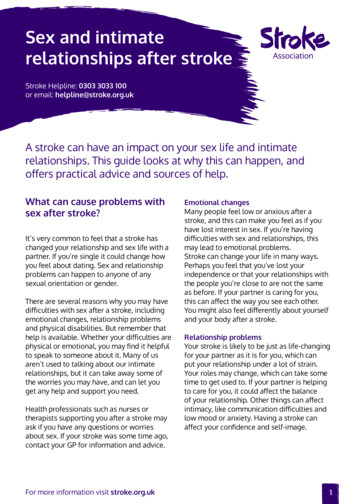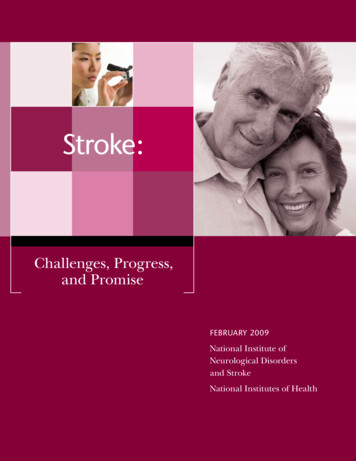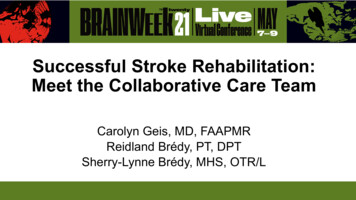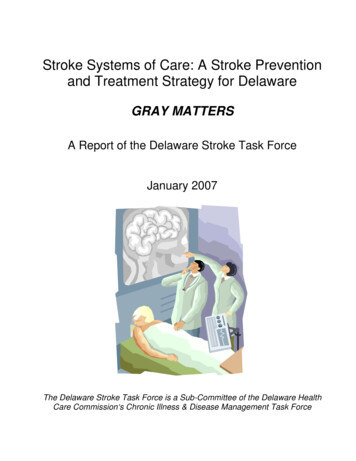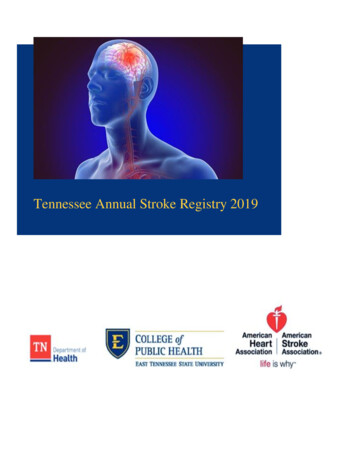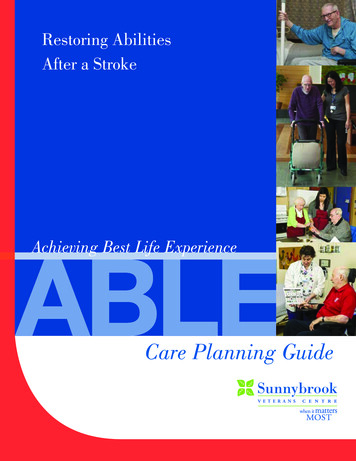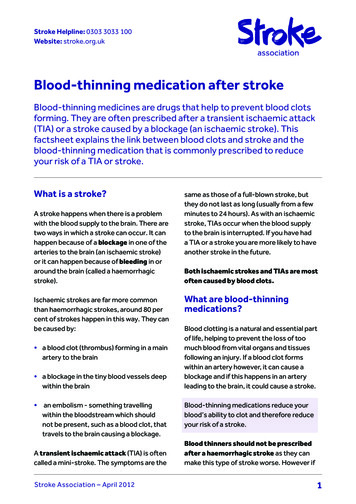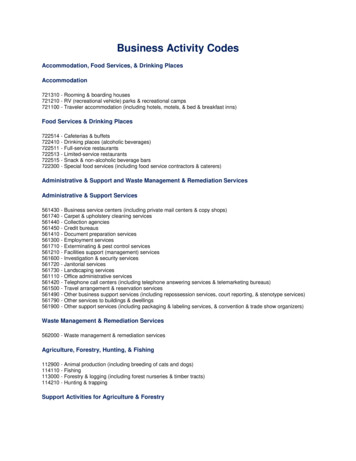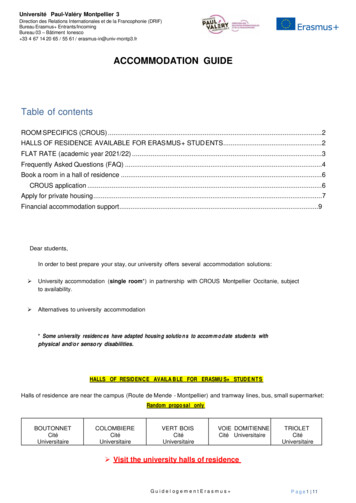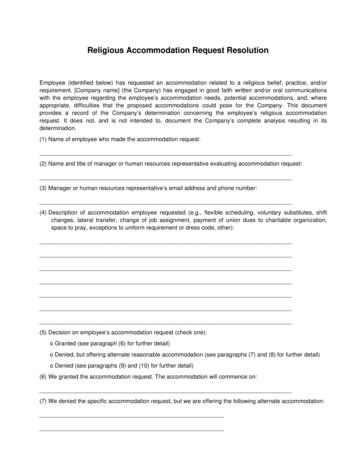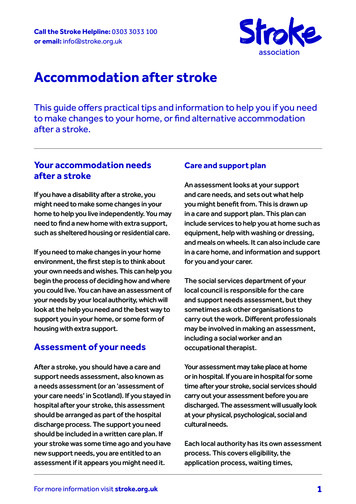
Transcription
Call the Stroke Helpline: 0303 3033 100or email: info@stroke.org.ukAccommodation after strokeThis guide offers practical tips and information to help you if you needto make changes to your home, or find alternative accommodationafter a stroke.Your accommodation needsafter a strokeIf you have a disability after a stroke, youmight need to make some changes in yourhome to help you live independently. You mayneed to find a new home with extra support,such as sheltered housing or residential care.If you need to make changes in your homeenvironment, the first step is to think aboutyour own needs and wishes. This can help youbegin the process of deciding how and whereyou could live. You can have an assessment ofyour needs by your local authority, which willlook at the help you need and the best way tosupport you in your home, or some form ofhousing with extra support.Assessment of your needsAfter a stroke, you should have a care andsupport needs assessment, also known asa needs assessment (or an ‘assessment ofyour care needs’ in Scotland). If you stayed inhospital after your stroke, this assessmentshould be arranged as part of the hospitaldischarge process. The support you needshould be included in a written care plan. Ifyour stroke was some time ago and you havenew support needs, you are entitled to anassessment if it appears you might need it.For more information visit stroke.org.ukCare and support planAn assessment looks at your supportand care needs, and sets out what helpyou might benefit from. This is drawn upin a care and support plan. This plan caninclude services to help you at home such asequipment, help with washing or dressing,and meals on wheels. It can also include carein a care home, and information and supportfor you and your carer.The social services department of yourlocal council is responsible for the careand support needs assessment, but theysometimes ask other organisations tocarry out the work. Different professionalsmay be involved in making an assessment,including a social worker and anoccupational therapist.Your assessment may take place at homeor in hospital. If you are in hospital for sometime after your stroke, social services shouldcarry out your assessment before you aredischarged. The assessment will usually lookat your physical, psychological, social andcultural needs.Each local authority has its own assessmentprocess. This covers eligibility, theapplication process, waiting times,1
Accommodation after strokedecisions, the services they can provide andcomplaints. You can ask to see a copy of thisdocument.Following the assessment, social servicesand your local health service will decideif you need any community care servicesand, if necessary, they will put together apackage of support for you. They should tellyou their decision and the reasons for it inwriting.If you find it difficult to look after yourselfand they feel your needs cannot fully be metat home, they may recommend you moveinto a care home. If you need to live in a carehome they will then carry out a financialassessment to see how much you shouldcontribute to the cost.NHS continuing healthcareDepending on your needs, you may qualifyfor NHS continuing healthcare. This isa package of ongoing care and supportarranged and paid for by the NHS. It canbe provided in your own home or in a carehome. The NHS would pay for your carehome fees as well as any medical care.To find out if you are eligible, you gothrough an NHS assessment process. Theassessment involves an initial set of checksagainst a list of eligibility criteria, completedby a health or social care professional.Afterwards, you may be referred for afull assessment. This will involve severaldifferent professionals and will look atdifferent types of care needs such asmobility and nutrition.2Help in your own homeA care and support plan might suggestequipment or alterations that could help youin the home. This could include grab rails orraised toilet seats. If you need equipment,or minor adaptations to your home such asbuying and installing a grab rail, you shouldget this free of charge through your councilup to the value of 1000. A council can makea charge for minor adaptations costing morethan 1000.If you need a larger alteration to your home,such as widening doors or installing a stairlift, the Disabled Facilities Grant is availablethrough local authorities in England, Walesand Northern Ireland. This is means tested,so you could be asked to pay for some of thework. In Scotland, you can apply to the localauthority’s Scheme of Assistance for helpwith repairing and adapting housing if youhave a disability.Social care is not free, so if you need somecare services in your own home, you mayneed to pay for this yourself. If you areeligible for homecare services, this may beprovided by the council. You may be able toarrange it yourself, with funding from directpayments or a personal budget. Home helpand care is available from private providersand charities.If you need mobility equipment likewheelchairs or walking frames, youmight be able to get it on loan from theNHS. There is more information aboutequipment to help you live independentlyin our guide R03, Aids and equipment.Call the Stroke Helpline on 0303 3033 100
Accommodation after strokeMoving to a care homeA care home is a place where you can livewith support from staff 24 hours a day.The home will provide you with care andservices, a room (sometimes with en-suitefacilities), communal areas and meals.Residents will usually also be offered socialactivities. Homes are owned and run bylocal authorities, voluntary organisations orprivate companies. Your choice of care homewill firstly depend on the amount of careyou need.Sometimes people need to go into a carehome on a temporary basis, possibly for atrial period or to give themselves or theircarer a break.Types of care providedinformation will reassure you and help youto make the right choice. If you need moresupport or someone to talk to, you cancontact our Stroke Helpline. See Where toget help and information at the end of thisguide for our contact details.Specialist homesSome homes specialise in caring for peoplewith particular medical conditions. Often,they will list several conditions and mayinclude stroke. People with dementia (whichcan happen alongside stroke) may need ahome that can provide specialist dementiacare. Sometimes these are called EMI(elderly mentally infirm) homes. Your agemay affect your choice of where to live. Somecare homes specifically provide support foryounger adults.Some care homes will just provide personalcare such as help with dressing andwashing. Usually, they will be more suitablefor people who have some mobility andindependence.Some homes will provide personal care andnursing care (care that needs to be carriedout or supervised by a qualified nurse), suchas applying dressings. In homes that providethis level of care, a nurse will be on call 24hours a day. You may need to live in a carehome that provides nursing care if you areunable to leave your bed or require regularmedical attention. Some homes that areregistered to provide nursing care will acceptpeople who might need this type of care inthe future.For many people, the thought of movinginto a residential home is very frightening.In particular, you may worry about losingyour independence. We hope the followingFor more information visit stroke.org.uk3
Accommodation after strokeHow to find a care homeWhen choosing a care home it’s a good idea todo plenty of research and find out as much aspossible. You may want to get support fromyour family with the decision. With a closefriend or relative, you may decide to visit eachhome you are considering to see what it islike first-hand before making a choice. Socialservices can provide you with a list of carehomes in your area. The organisations listedat the end of this guide can also help.Every person’s situation is different. It mayhelp if you take a list of questions withyou on your visits. See the Choosing a carehome: checklist for some questions andtopics you might want to think about whendeciding on a care home.Who decides where I live?If social services carry out an assessmentand suggest you move into a care home, youcan choose not to go, provided you have themental capacity to make the decision. Youhave the right to have some choice aboutwhere you live. If your local authority iscovering all or part of your care home fees,you can have a say about the home you livein, providing your choice: suits your assessed needs has a place available can agree the support to be providedwith your local authority, and costs no more than the amount thelocal authority would usually pay.If you need to go into a care home but havedifficulty expressing your own views, friends4and family may be involved in discussions.You may find support from an independentadvocacy scheme helpful. An advocate issomeone who can support you, representyour interests and take action on your behalf.You may already have appointed someoneyou trust (such as a family member or closefriend) to make decisions about your healthand welfare or your finances by giving thempower of attorney. A power of attorney isa legal agreement to allow someone to acton your behalf. A husband or wife does notautomatically have the right to handle theirspouse’s affairs. If you are married or in acivil partnership, you may need to give yourpartner power of attorney to allow them theauthority to act on your behalf if necessary.What if the care home does not havea place?If your preferred home does not have a place,you may need to go on a waiting list. Whileyou wait, you may need to go into anotherhome or arrange for services in your ownhome. Any temporary care home should stillmeet your needs. The local authority shouldexplain how the waiting list works and keepyou informed of any progress.What if I want to live in a differentarea?If you pay for your care home place yourself,you can decide where you live. Otherwise,if you wish to live in a care home in anotherarea of the country, the responsibility forpaying for your accommodation will remainwith the local authority where you currentlylive. Your local authority must then agree tocover the cost of the home, or if the cost ismore than the available funds you may needto pay the top up fee.Call the Stroke Helpline on 0303 3033 100
Accommodation after strokeFinancial considerationsHow much will I pay for a care home?The cost of a place in a care home tends tovary from one area to another and will beaffected by the facilities, support and levelof care offered. Average prices in 2016–2017were from 29,000 in Northumberland to 54,000 a year in Kent. Most people have tocontribute towards their fees.In Scotland, the social work departmentwill automatically contribute to part of yourcare home fees if you are over 65 and theirassessment shows you need personal care(or both personal and nursing care). If youare under 65, they will pay towards the fees ifyou have been assessed as needing nursingcare. They will then carry out a financialassessment to see how much you can affordto pay towards any remaining costs.In the rest of the UK, your local council willcarry out a financial assessment to decide ifyou should contribute and if so, how much. Alllocal councils should follow the Government’srules set out in the Care Act 2014 whendeciding how much you will need to pay.What does an assessment involve?A social worker or care manager usuallycarries out the financial assessment afteryour health and social care needs have beenreviewed. They will look at your ability topay for your care, taking into account yourincome, savings, property, any benefitsyou receive, and any financial assets youhave such as stocks or shares. There arerules about what will be counted in theassessment and some income will bedisregarded. The social worker will usuallyask to look at financial documents, suchFor more information visit stroke.org.ukas bank statements, records of savings, ordetails of pension schemes. They will askabout your outgoings, such as how muchyou pay for your mortgage, rent, insuranceor bills. You can ask questions and havesomeone else there to help you.Unless you are able to cover the whole costof a care home yourself, the council will tellyou how much they can pay per week for ahome that meets your assessed needs. Theyshould also give you a list of homes in yourlocal area which can meet your needs.If the council is covering the entire cost andthere are no places in a suitable care homeat the right price, the council should increasethe amount they will pay.Even if you are going to pay your own fees, itis a good idea to have an assessment. Socialservices can advise you of the costs so youcan plan for these.Will I have to sell my home?You will not necessarily have to sell yourhome to pay for a care home. If you areonly staying in a care home for a temporaryperiod, the value of your home will beignored. Different councils work out the costof temporary stays differently.The value of your home will not be takeninto account if one of the following people isgoing to continue living in your house: your husband, wife, civil partner orother partner you live with a relative who is 60 or over, or ayounger relative who is eligible to claimdisability benefits5
Accommodation after stroke a child (under 16) whose welfare youare responsible for an ex-partner if they are a singleparent.Even if the value of your home is notexcluded, you may not have to sell it if youcan raise the fees in another way. Age UKcan provide detailed information aboutcare home costs. See Other sources of helpand information. If you need the funds fromthe sale of your home to pay for your care,the council will pay for your care home feesfor 12 weeks, or until you are able to sellyour property. You will not be expectedto pay this money back to the council.If you have less than 23,250 in savings(not including the value of your home)you will also be able to defer payment ofyour fees until after your death, when thecouncil will be able to recover the moneyfrom your estate.What if I want to live in a moreexpensive care home?If your chosen care home costs more perweek than the council is willing to pay, youare allowed to ask a family member or friendto pay the difference. This is called a ‘thirdparty top up’.What about my partner’s money andassets?it is usually unlikely that someone wouldbuy just your share. There are rules tostop you moving money out of your hometo purposely avoid it being included in afinancial assessment.Paying for nursing careIf you are eligible for NHS continuinghealthcare, the NHS will fund the fullcosts of your care. In England there is aNational Framework, which sets out howyour eligibility for funded care should beassessed. A similar situation applies inScotland and Wales. However, there is noguidance in Northern Ireland, meaningthat decisions come down to individualauthorities.If you are not eligible for NHS continuinghealthcare but you have nursing careneeds, you may be eligible for free nursingcare. This means that the NHS will makea payment to the care home to cover thenursing care costs.BenefitsIf you move into a care home permanentlyyou may still be able to claim benefits suchas Attendance Allowance and the councilwill expect you to do this if they are payingfor your care. For more information aboutwhat you may be able to claim, see our guideR01, Benefits and financial assistance.If you share capital (other than property)with another person or people, you will beassessed as each having an equal amountof this for the financial assessment. Forexample, if you have a joint bank accountwith your partner, half of the balance willbe considered your capital. Jointly ownedproperty is treated differently because6Call the Stroke Helpline on 0303 3033 100
Accommodation after strokeChoosing a care home: checklistYou could take this list of questions with youwhen you visit a home.Where is the home? You might feelhappier moving somewhere near to yourfriends and family. However, narrowing yoursearch to a very limited area can mean youdon’t have much choice.How much does it cost? What is theweekly fee? How often does the homeincrease its fees and will you be able to affordany increases? How much do you pay if yougo into hospital or away on holiday? Do theycharge for extras, such as a TV in your room?What care provision is offered? If youneed more care in the future, will the homebe able to meet your needs?What about hygiene? Does the homesmell clean and fresh?What is the accommodation like? Arethe rooms shared or single? What facilitiesare available? Your room should include alockable place to put personal items likemoney.Are you allowed to bring personalpossessions or furniture with you?Are residents given privacy? For example,do staff knock before entering rooms?How accessible is it? If you use awheelchair, are door frames and corridorswide enough? Are there ramps and lifts?Is appropriate equipment provided suchas handrails and adjustable beds?For more information visit stroke.org.ukIs it a place where you will feelcomfortable and safe?What kind of food is provided? Are mealtimes fixed and if so, what are the times?Can residents prepare their own food? Doesthe home cater for special diets?Look at the living areas. Are there areaswhere residents can socialise, sit quietly, seevisitors, or sit outside?What kinds of activities can residentstake part in? Are books and newspapersavailable? Are outings arranged? Will yoube able to continue a current hobby? Canresidents go out alone, for example tothe shops or to a stroke club? Do they getinvolved with the local community?Can your religious beliefs or culturalneeds be accommodated? Some homeshave a place of worship. Are staff interestedin learning about your background andculture? Can they speak your language?Is there a positive atmosphere youwould feel comfortable in? Watch and talkto the residents and staff to see how friendlyand happy they are.Will you get personalised support?Does the home pay attention to eachresident’s individual needs or expect allresidents to follow a certain routine?Is maintaining as much independenceas possible encouraged? Do staff supportresidents to do things for themselves?What are the visiting hours? Can yourfamily and friends join you for a meal or stayovernight?7
Accommodation after strokeAre staff friendly and supportive?Do they treat residents with respect?Do they spend time talking to residents?What is the staff to resident ratio?Do they understand the effects of stroke?What qualifications and level of training dothey have? We offer training to care homestaff. You may want to ask if any staff haveattended our Stroke Care Pathway courses orsimilar training. The Stroke Association alsooffers a Care Award for homes whose staffhave been trained in stroke awareness.Do you have difficulty withcommunication? Do the staff understandthis and know how to support you? Do theyhave the skills to support you with any hiddeneffects of your stroke, such as personalitychanges, memory problems and tiredness?Which health services are available? Whathappens if a resident is unwell? What doctorscan they see? Who administers medicine?What about community services?Do community physiotherapists, speechtherapists and occupational therapists visit?How do residents access other services suchas chiropodists or dentists?How are decisions made? Is there aresidents’ association to give people a sayabout things that affect them?What information is available? All carehomes are required to produce a ‘statementof purpose’. This document tells you aboutthe home’s aims and objectives and theservices they provide.Do they offer trial stays? Find out if youcan have a trial stay to decide if the home isright for you.8What is the complaints procedure?Can you take your pet with you? Somecare homes do not allow pets, so you mayneed a relative to take over their care.Alternatively, the Cinnamon Trust is a charitythat can provide long-term care for a petwhen their owner has had to go into a carehome that cannot accommodate pets. SeeOther sources of help and information at theend of this guide for their contact details.How do I know which carehomes are good?There are independent regulators to makesure care homes meet set standards. Socialcare services, including care homes, areregulated by: The Care Quality Commission (CQC) inEngland The Regulation and QualityImprovement Authority (RQIA) inNorthern Ireland The Care Inspectorate in Scotland The Care and Social ServicesInspectorate in Wales (CSSIW).These bodies produce inspection reportson homes that you can read. These will tellyou how the home you are considering wasrated in terms of quality, what residents sayabout it and whether there are any areas forimprovement.If services are not meeting standards,regulators can issue notices requiring themto make changes within a set period of time,issue penalties and restrict the services theycan offer.Call the Stroke Helpline on 0303 3033 100
Accommodation after strokeHow do I make a complaint about acare home?If you have any concerns or are not happyabout your care or treatment in a care home,it can help to initially raise your concernswith a member of staff in the care home.A friend or relative could do this on yourbehalf. You should never be disadvantagedbecause of any concerns you (or a familymember) have raised.All social care providers are required bylaw to have a complaints procedure andall residents should be provided withinformation explaining how they canmake a complaint. If you are not given thisinformation you can ask for it. If you make acomplaint following this procedure and youare not happy with the response, you cancontact your local council, if they are fundingyour care.If you are still not happy after this or if youfund your own care, you can contact theLocal Government Ombudsman. Thisis an independent body that can reviewcomplaints – see Other sources of help andinformation at the end of this guide for theircontact details. If the NHS is funding yourcare you will have access to their complaintsprocedure.Sheltered housingIf you need some support but not 24-hourcare, sheltered housing may be an optionfor you. Sheltered housing can help youlive independently with the added securitythat there is someone nearby to call in anemergency. This type of accommodationis usually for people over 60 but can beavailable for younger people. It is providedby local councils, housing associations(registered social landlords) and voluntaryorganisations. Private companies also run asmall number of schemes. You can usuallyrent or buy sheltered housing.These schemes usually have a wardenor scheme manager who lives on site ornearby. Their responsibilities will usuallyinclude managing the day-to-day runningof the scheme, checking on residents’wellbeing, giving residents information onlocal services and helping with emergencies.They are not there to provide personalservices, such as care, or help with shopping,cooking and cleaning, but they may be ableto help you arrange these services.The schemes generally consist of groupsof flats or rooms to give you privacy andcommunal areas shared with other residents.They usually welcome individuals or couples.You can contact your local council’s housingor social services department to find outmore about sheltered housing in your area.Extra care sheltered housingThis is a type of sheltered housing whereresidents are provided with extra care andsupport. The scheme may have staff tohelp with personal care such as bathing anddressing. Ask your local council if there areany of these schemes in your area.For more information visit stroke.org.uk9
Accommodation after strokeChoosing sheltered housing:checklistIt may help to visit the housing, ask questionsand see for yourself what it is like. You mayfind it helpful to ask some of these questions.Location – Is the scheme in a suitablelocation, which is easy to get to? Will yoube near family and friends in a familiar area?Are there local amenities and shops nearby?Is there adequate local public transportavailable? If you drive, is there somewhereto park your car?Costs – How much will you have to payin rent or mortgage payments? How muchwill you be paying for council tax, insuranceand bills? Are there service charges to payfor the warden, alarm system and upkeepof communal areas and how are theseworked out? If you live in extra care housing,will there be charges for the care supportprovided? You may still be entitled tofinancial support, such as benefits. See ourguide R01, Benefits and financial assistance.Accommodation – What is theaccommodation like? Is there enough space?Does the layout suit your needs? What kindof heating system is provided and is it wellinsulated?Storage – Is there somewhere to storeequipment like a wheelchair or mobilityscooter?Security – How secure is the mainentrance and each home?Alarms – Sheltered housing usuallyincludes an alarm system for residents to useif they need emergency help. Find out howthis works and what action will be taken ifyou need to use it.Atmosphere – See what the atmosphereis like and whether other residents enjoyliving there.Management – The warden or schememanager’s duties will vary for each scheme.Find out what their duties are, whether theyprovide 24-hour support and live onsite.Maintenance – Who is responsible forrepairs and improvements?Decisions – Will you have the opportunityto be involved in decisions that affect you?Social life – Will friends be able to visit?Will there be opportunities to socialisewith other residents? Are social activitiesorganised?Facilities – Are shared facilities such aslaundry areas available?Cultural and religious needs – Will thesebe met?Accessibility – Is there a lift? If you use awheelchair are the door frames and corridorswide enough? Would you be able to makeadaptations if necessary, such as adding ahandrail?Pets – If you have a pet, find out whetherthe scheme allows them.Visitors – Is there a guest room?Services – Are services, such ascommunity nurses, part of the scheme?10Call the Stroke Helpline on 0303 3033 100
Accommodation after strokeSupporting a loved oneMoving home can be a huge emotionalupheaval. The change may be distressing forboth you and your loved ones. It can be hardfor someone to leave their home, particularlyif they have lived there for a long time.On the positive side, the move will enablethem to get more help and support anda good care home will help new residentssettle in. Providing ongoing support to yourloved one, both practically and emotionally,will also help.Other things you can do include: gaining information about the home soyou are fully informed thinking about any fears your loved onehas and what might help reduce these helping them find ways to keep in touchwith family and friends encouraging them to talk to otherresidents about the experience andjoin in with social activities finding out who to go to for extrasupport allowing time to adjust to the changes looking after your own health andwellbeing and taking regular breaks ifyou can, so you can carry on providingsupport.For more information visit stroke.org.ukWhere to get help andinformationFrom the Stroke AssociationTalk to usOur Stroke Helpline is for anyone affected bya stroke, including family, friends and carers.The Helpline can give you information andsupport on any aspect of stroke.Call us on 0303 3033 100, from atextphone 18001 0303 3033 100 or emailinfo@stroke.org.uk.Read our publicationsWe publish detailed information about a widerange of stroke topics including reducingyour risk of a stroke and rehabilitation. Readonline at stroke.org.uk or call the Helpline toask for printed copies.Other sources of help andinformationInformation about care homesAge UKWebsite: www.ageuk.org.ukAdvice Line:0800 678 1174 (England)0808 808 7575 (Northern Ireland)0800 12 44 222 (Scotland)08000 223 444 (Wales)A charity that works to improve later lifefor everyone through support and advice.They offer information about the financialand practical aspects of going into acare home.11
Accommodation after strokeAssociation of Independent Care Advisers(AICA)Website: www.aica.org.ukTel: 01483 203 066The AICA can put you in touch with a localindependent care adviser – they representorganisations that help people identifythe type of care service and providerthey need.Care Information ScotlandWebsite: www.careinfoscotland.co.ukHelpline: 0800 011 3200Provides information about care services inScotland.Elderly Accommodation Counsel (EAC)Website: www.eac.org.ukFirstStop Advice: 0800 377 7070Helps older people to make choices abouttheir housing and care needs, and offersaccommodation details. Their FirstStopAdvice line offers impartial advice andassistance.Housing Advice Northern IrelandWebsite: www.housingadviceni.orgTel: 028 9024 5640Provides independent housing information.Independent AgeWebsite: www.independentage.orgHelpline: 0800 319 6789Provides information and advice for olderpeople, focusing on social care.The Relatives and Residents AssociationWebsite: www.relres.orgAdvice line: 0207 359 8136Supports older people who need or live inresidential care, as well as their family andfriends.12Scottish CareWebsite: www.scottishcare.orgTel: 01292 270 240Represents a large range of care homes andproviders in Scotland. Search their websitefor homes in different regions.ShelterWebsite:www.shelter.org.uk (England and Scotland)www.shelterni.org (Northern Ireland)www.sheltercymru.org.uk (Wales)Helpline:0808 800 4444 (England and Scotland)0345 075 5005 (Wales)028 9024 7752 (Northern Ireland)Provides information, advice and advocacysupport for people with housing problems.Government websitesEach website offers information about publicservices such as health and social care.GOV.UK (England and Wales)Website: www.gov.ukNI Direct (N
Call the Stroke Helpline: 0303 3033 100 or email: info@stroke.org.uk For more information visit stroke.org.uk 1 Your accommodation needs after a stroke If you have a disability after a stroke, you

